UN Council set to demand Iran suspend nuclear work
UNITED NATIONS - The U.N. Security Council was poised to adopt a resolution demanding Iran suspend its nuclear activities by the end of August or face the threat of sanctions.
Barring last-minute delays, the council has scheduled a vote on the document that demands Iran "suspend all enrichment-related and reprocessing activities, including research and development."
If Tehran does not comply by August 31, the council would consider adopting "appropriate measures" under Article 41 of Chapter 7 of the U.N. Charter, which pertains to economic sanctions, says the draft.
The resolution is the first on Iran with legally binding demands and a threat to consider sanctions. The United States and its allies suspect Iran is developing a nuclear bomb and accuse it of hiding research over 18 years.
On the eve of the anticipated vote, Iranian President Mahmoud Ahmadinejad told a news conference the resolution was unacceptable and his country had the right "to take advantage of peaceful nuclear technology."
Foreign Ministry spokesman Hamid Reza Asefi also warned recently the resolution would create what he called a deeper crisis in the Middle East, but he did not elaborate.
Germany and the council's five permanent members with veto power - the United States, Russia, China, France and Britain - reached broad agreement recently and no major changes were made.
But Russia and China are reluctant to impose sanctions and Moscow's U.N. ambassador, Valery Churkin, told reporters the sanctions provision meant the council would have "a discussion" only on punitive measures.
Churkin also said the August 31 date was to meet Iran's request that it be given until August 22 to respond to an offer in June from the six nations of an energy, commercial and technological package if Tehran suspended its nuclear work.
But U.S. Ambassador John Bolton told reporters that "if Iran fails to comply with this mandatory obligation, we will move to sanctions in the Security Council."
Iran's Asefi said Tehran would stop considering the incentives if the resolution were adopted.
Asefi said Tehran could still reply to the incentive package if the Security Council held its fire.
The resolution is drafted under Chapter 7 of the U.N. Charter, Article 40, which says the council, before taking any action, can call on the those concerned to "comply with such provisional measures as it deems necessary."
Chapter 7 makes a resolution mandatory and provides options for enforcement. The document excludes any military action.
Related News

Class-action lawsuit: Hydro-Québec overcharged customers up to $1.2B
MONTREAL - A group representing Hydro-Québec customers has filed a motion for a class-action lawsuit against the public utility, alleging it overcharged customers over a five-year period.
Freddy Molima, one of the representatives of the Coalition Peuple allumé, accuses Hydro-Québec of "abusing its monopoly."
The motion, which was filed in Quebec Superior Court, claims Hydro-Québec customers paid more than they should have for electricity between 2008 and 2013, to the tune of nearly $1.2 billion.
The coalition has so far recruited nearly 40,000 participants online as part of its plan to sue the public utility.
A lawyer representing the group said Quebec's energy board, the Régie de l'énergie, also recently approved Hydro-Québec…




